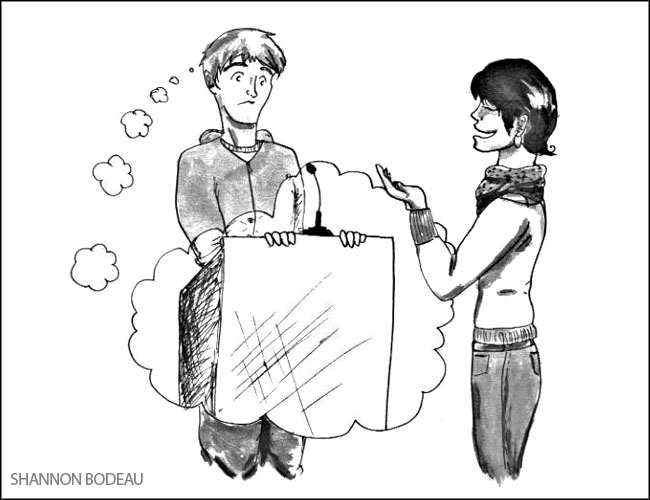
Sweaty palms, a pounding heart, and racing thoughts are all symptoms of cold feet. While some students possess these symptoms, others feel comfortable enough or even enjoy the spotlight while they speak. These two different frames of mind may have something to do with a person’s day-to-day sociability.
Although public speaking comes easily for some, others must approach it in steps. Sophomore Ayah Hamdan agrees, “If you can talk well in front of one person, then that’s the next step being able to talk well in front of a bunch of people.”
Junior Diego Martins embodies such a character. “I’m not really scared [to publicly speak] because I talk a lot anyways. I get nervous because I might mess up but I’m not freaked out about it,” he says. Freshman Kimberly Arellano, who is more socially reserved, is a countering example. “I’m afraid of [public speaking]. I don’t like speaking in front of people because it’s just how I am – I’m shy,” she says.
While it’s clear to see the effects social skills can have on speaking skills, other factors are proven to have similar effects. Hamdan sees knowledge as a factor contributing to confidence in public speaking. “Being able to know what you’re talking about will really help. If you’re not familiar with [the subject], you’re not going to be able to talk about it well. I did really well on my speech in English last semester because it was about the Jonas Brothers – something I was really familiar with.” Martins takes a different spin. “[One factor] might be at home life: How your parents are, the way you were raised, the setting you’re around,” he says.
Biology teacher Cathryn Kliegel believes an important component to gaining confidence is knowing how to publicly speak. She says, “[Good public speaking skills] is all about confidence and knowing how to stand, knowing how to make eye contact, knowing how to project your voice, and knowing how to pace your words so you’re not speaking too quickly.”
While there are many factors, the most influential one seems to be the audience. Senior Emmanuel Permito says, “I don’t really like [public speaking] because it gets me nervous just seeing all those people.” Freshman Oma Skyrus says, “I get scared because [I’m] talking in front of people that can judge [me] based on what [I’m] saying.” Even teachers experience a shift in confidence correlated to a change of audience. Kliegel says, “I’m not nervous in front of my class but I tend to get nervous if I’m speaking in front of the faculty or in front of adults. It probably has to do with what I do everyday. Teachers are isolated in their classrooms with their students for the majority of what they do. We’re not actually working with adults most of the time, we’re working with our students.”
Arellano recalls a specific incident in which the audience size and composition affected her feelings toward public speaking. “At my fifth grade graduation I had to speak out in front of the whole school and in front of my friends and I felt so shy, I forgot some of the things I was supposed to say,” she says.
Kliegel also shares a similar memory. “I was in a speech contest in fifth grade and I was presenting some poetry from [Through the Looking Glass by Lewis Carroll].They asked me to come at night and present my speech in front of the PTA and I didn’t bring my text with me because I had memorized it. So there I was in front of a huge crowd of parents and the microphone kept moving because the cord was being moved. I kept trying to move with the microphone and ended up forgetting my speech in front of all the parents and the PTA. Looking back I know they were feeling worse than how I was,” she says.
There are many things that can affect students’ feelings toward or fear of speaking in public, whether it be the audience, social skills, or familiarity with formalities of public speaking. But, at the end of the day, lacking sociability or not being the most outgoing person in the world aren’t things that have a negative quality. Keep in mind, public speaking does not come naturally for everybody; however, practice and experience can lead to gradual enhancement of public speaking skills. Moreover, many more talents exist in the world, waiting to be claimed.



